Participating Farms
Nine farms from three different countires participate in the CarbonToSoil project: Finca Luena farm, Taylor Creek farm, Stone Prairie farm, Knehtilä farm, Koskis farm, Kuitia farm, Mäenpää farm, Sippola farm and Tyynelä farm.
This research project is unique in that it combines all three types of land use management. In this investigation we look at reforestation, cattle/pasture management, and commercial crop production all on the same tropical farm. Crops that are grown include: cassava, turmeric, ginger, taro root, sweet potato, banana, plantain, corn, various beans, various leafy greens, and vegetable crops. Cattle that are produced are dual-purpose bred cattle for meat and dairy production. The reforested land is land that was once in open cattle grazing, and now has been replanted to the native humid tropical rainforest.
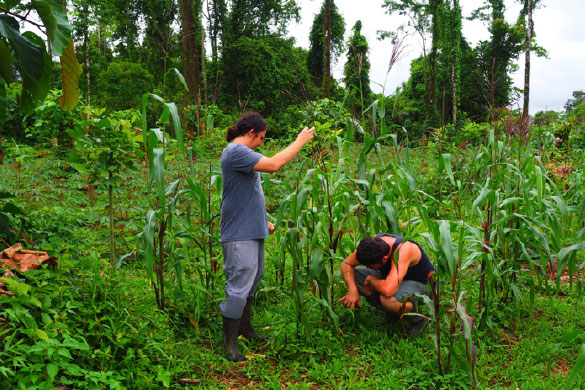
The Farmers
Josef Biechler. Josef is a graduate of Maharishi University of Management with a B.S. in Sustainable Living, where he studied soil biology and ecology and its role in regenerative agriculture. A life-long farmer, Josef grew up in central Iowa on a beef and dairy farm that practiced regenerative farming methods. He is well versed in sustainable farming methods—including permaculture, Grow Biointensive, and Biodynamic—and is a master composter with extensive microscope experience. Currently, Josef is the co-owner of Red Clover Consulting, a business that helps organic producers improve and maintain their soil fertility through composting. He also manages composting systems at Finca Luna Nueva in Costa Rica and manages the Tropical Farming Systems Trial that is supported by The Carbon Underground.
Danilo Solano Rojas Danilo is a graduate from EARTH University, with a masters in agroecology from the National University of Costa Rica. Currently he is the president of the Carbon Farmers Association from Costa Rica. He was born in Costa Rica, raised in a 2nd generation family farm in la Fortuna de San Carlos where he currently lives. He believes that in order to reverse climate change it is crucial to promote and teach about Regenerative Agriculture among farmers of Latin America and the humid tropics of the world, where most of the small farmers live. At the same time he works in projects related to: Biodynamics, Rotational Intensive Grazing Systems, Tropical Apiculture and Meliponiculture, local entrepreneurship, and community development.
Two hundred and ten acres is developed as one of the very largest native plant nurseries in the USA. The permanent protection of this property is now underway to ensure it never is converted to development or conventional agriculture. The property provides a buffer function for an adjacent state scientific area (Swenson State Natural Area) and also for Taylor Creek and the Sugar river; both are very sensitive and largely wild natural areas.
Taylor creek Restoration Nurseries grows seeds and plants for 650 native locally derived genetically sourced species of wild plants used in the regional by other landowners to restore their land.
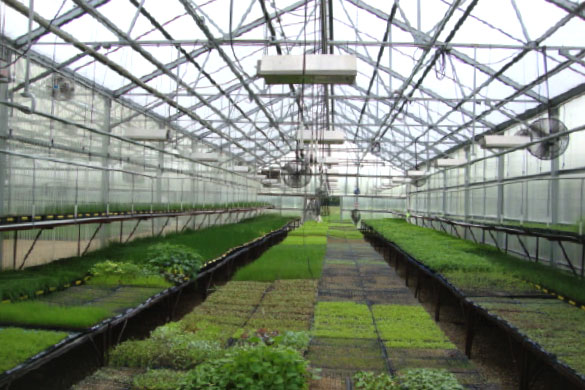
Stone Prairie farm has been undergoing ecological restoration of prairies, wetlands, savannas and a first order trout stream since 1981. Most of the farm is being restored with approximately 5 acres in fruit orchards, vegetable gardens, and wildflower gardens, and also includes the home of Steven and Susan, one of the oldest timber frame barns in Green County, Wisconsin; and several other outbuildings. Steve and Susan have constructed a root cellar to keep food over the winter without refrigeration and also have built large solar dehydrators that used to dehydrate vegetables and fruit and venison jerky used as their food and to feed research teams for remote wilderness research projects they are involved with in Canada and elsewhere around the world. This farm was purchased by Steve in 1981 and has now been one of the longer private restoration projects in the USA. The land has been permanently protected with conservation easements for the future. This farm occupies a very interesting geological setting on the Illinoian glacial till moraine landform, which contains older weathered clay till soils.
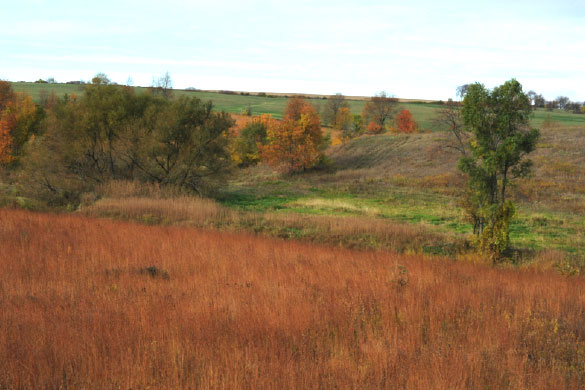
The farmers
Steven I. Apfelbaum and Susan M. Lehnhardt are focused primarily as ecologists/scientists. While they do own and operate Applied Ecological Services, Inc and Taylor Creek Restoration Nurseries, professional management teams actually run the business. Both Steve and Susan are trained plant ecologists; Susan is also trained as an artist, while Steve is trained in animal ecology among other areas. Steve is one of a few certified and registered Senior Ecologists with the prestigious Ecological Society of America. Steve is also the farmer in the family, personally raising a large percentage of the fruit and vegetables, honey, apple cider, and much more that their family eats annually.
Steve teaches annually at Harvard University’s Graduate School of Design, a course on the future of coastal systems on earth. This course integrates the future of food system, energy system, biodiversity and human quality of life and economies in the highly dynamic and vulnerable coastal environments. The class typically has dozens of students from dozens of countries annually and also includes policy, business, legal, and agriculture students concerned about the future of the most populated areas on earth—the coastal zones. Susan is a senior ecologist with the firm. Since 1978 Steve has serve the ecological restoration marketplace and along with Susan and over 150 staff located in 12 USA offices, they have provided ecological restoration services (design, engineering, planting, seeding, management, monitoring, regulatory compliance, and much more on over 8000 projects in the USA and in over thirty other countries around the world.
Koskis farm is located in idyllic Salo, in the Raseborg region of Southwest Finland . The farm is best known for its large herd of organic Hereford cattle. In addition, the farm includes 200 hectares (494 acres) of organically cultivated fields that grow grass fodder, barley, rapeseed, rye, oats, and wheat. Tours are offered to share a true countryside experience.
Koskis farm invests to be more sustainable in all activities. In 2014 it was selected by the WWF as Finland's most environmentally friendly farm.
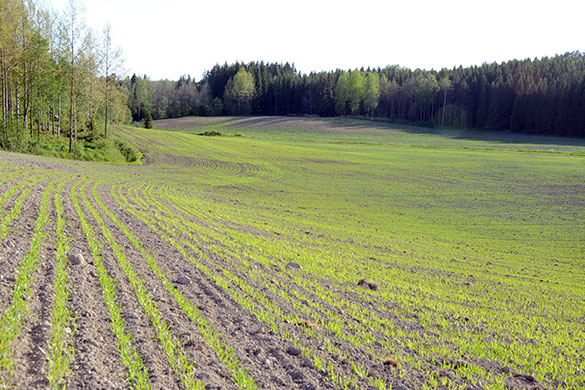
The farmer
Koskis farm is owned by Fredrik von Limburg Stirum, a trained Wildlife Biologist. He is active in several local and international organizations with projects that protect the environment. He is known for his work in agricultural water protection, nature conservation, game management, reviving and protecting biodiversity, climate change, and as an advocate for entreprenuership.
“My mission is to develop the farm in a sustainable manner, so that also future generations can enjoy the open and lively countryside. Responsibility to the environment is my life's work at Koskis farm."
These values are also echoed by Fredrik's wife, Helena von Limburg Stirum who is also actively involved in the management of the farm. Helena is a biologist with special interest in dung beetles and other biodiversity related issues. Visit the farm's website at http://koskis.fi.
Knehtilä is an organic farm located in Hyvinkää, Southern Finland. The farm currently cultivates wheat, rye, oats and barley. The CarbonToSoil project will first focus on a 13 hectare (32 ac) troubled plot with pea crops. The main farmhouse was built in 1838 and extended in 1860. The renovated old barn is a great space for arranging events such as weddings, birthdays and graduation parties. The gift shop sells the farm's own organic grain products as well as other local products and Finnish designed arts and crafts. Every spring the farm hosts a spring market with thousands of visitors; hope to see you there next year!
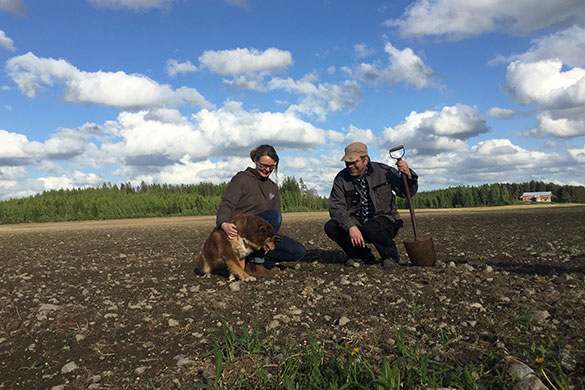
The Farmers
Knehtilä farm has been owned by the same family since the 18th century. Markus Eerola and Minna Sakki-Eerola are the eighth generation of Knehtilä family farm owners. The farm was long called by the name Eerola but Markus and Minna decided to change the name back to Knehtilä when they switched to organic farming methods.
Markus is also The Central Union of Agricultural Producers and Forest Owners (MTK) third chairman. He is happy to try out new and environmentally friendly cultivation methods. Hyvinkää’s environmental protection association has given the environment award of 2015 to Markus since he has promoted new farming methods among the first farmers since the 1990’s.
Tyynelä farm is located in Joutseno, South Carelia, Finland. There organic farming methods are used to produce high quality food, fodder, building and raw materials, and energy. The crops are mainly cereals, legumes, and oilseed for food and seed. The future target is to increase the diversity of crop production, processing of products, direct sales, and gain energy independence.
Ecological farming methods used by Tyynelä farm include versatile crop rotation, recycling of nutrients, and varietal mixture cultivation. Fertilizer application is based on nitrogen fixation and manure from neighboring livestock farms.
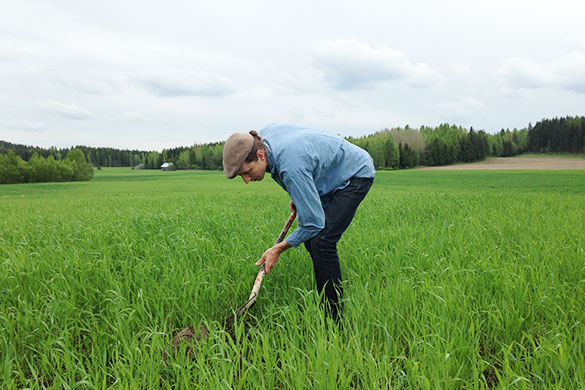
The Farmer
Juuso Joona is the current owner of Tyynelä farm. His family has owned the farm since 1943, when his great grandfather Aukusti Laakko bought it. Juuso is a pioneer of regenerative farming in Finland. First he was suspicious towards the more organic way farming, but that changed when he went to study the field in Wien. He realized that a healthy soil equals a safer future in farming – when farming industrially the soil becomes eventually so poor that it can’t continue producing big yields.
“Now we are paying back the debt that we took from the land when farming it industrially.”
Visit the farm's web pages at http://tyynelantila.fi.Sippola’s main farm is located in Isokyrö and the secondary farm is in Merikaarto, both in western Finland. Until 2012 the farm raised cattle but now the focus is on cultivating rye, barley, oat, and wheat. The farmers are continually investing in improved soil fertility in various ways. The plot reserved for the project is 17 hectares (42 ac) of barley.
The farm’s regional challenge is the flooding of nearby rivers which destroyed the harvest in Merikaarto a few years back.
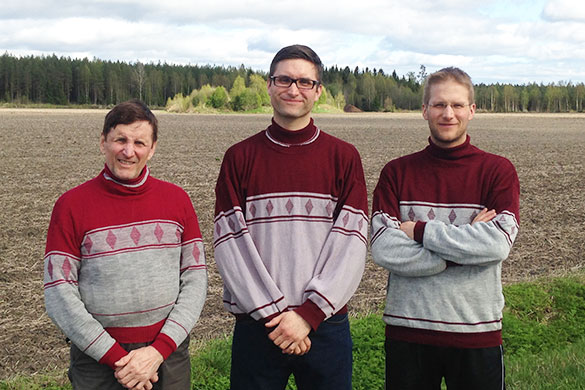
The Farmers
Sippola farm’s owners are brothers Juha, 35 and Jussi, 33. Both hold Masters of Science degrees and are former ski racers. The brothers work full-time for Finnish companies and spend much time at the fields.
Sippola has been farmed since the 16th century. The brothers have practically been raised on the fields, they are passionate about farming and it shows – how many people would have the energy to go to work on the fields after a hard day at the office and still enjoy it?
“When living in the beautiful countryside you really don’t miss the concrete jungle.”
Mäenpää farm is located in Metsäkylä, Finland - Southern Ostrobothnia’s scenic and soothing countryside. Until 2008 the farm raised dairy cattle but now it focuses on cultivating barley, rapeseed, oat, cumin, and fava bean on its 90 hectares of field. The most recent additions, cumin and fava bean, will be the first targets of the CarbonToSoil project.
The farms annual issue is migratory birds that stamp down the east part of the field now reserved for regenerative farming methods. Thankfully, the scarecrows put up last year work quite well.
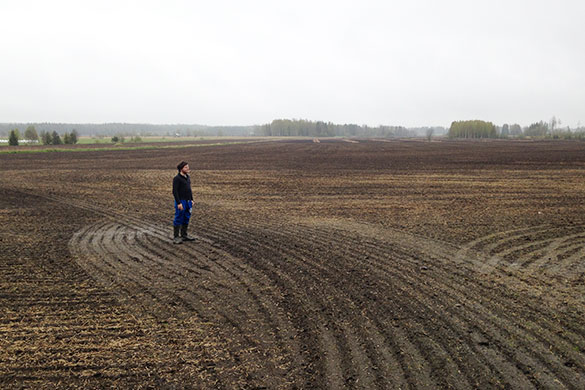
The Farmer
Jarmo Mäenpää is the fourth generation farmer on Mäenpää farm. He is an information technology mechanic, a mechatronics engineer, and an electrician with his own electrical installation company. Jarmo has many amusing memories from when they had dairy cattle on the farm – sometimes he had races with the bulls, but he admits that he had to get a good head start so that he wouldn’t lose. Jarmo is very excited about the project and wants to especially emphasize the importance of plants with long roots when improving soil fertility.
When Jarmo isn’t busy with farming this summer, he is probably expanding the space for grain processing, fixing the roof of a 100-year-old smoke sauna, and most importantly, playing football with his son.
Kuitia Manor is located on one of the beautiful islands of Parainen, in southwest Finland. The farm is on the site of a stone castle which history leads back to the 15th century, which makes it the oldest manor in Finland.
The farm has 250 hectares (618 ac) of arable land. The mission of the farm is to develop more productive organic farming methods. Current crops include wheat, oats, barley, and sugar beets. In the future livestock will also be raised on the farm.
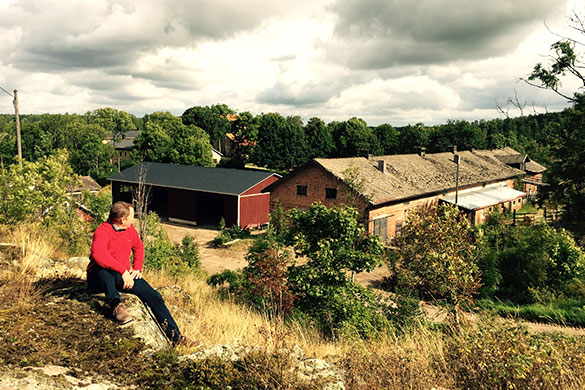
The Farmer
Ilkka Herlin bought the Kuitia farm in 2014. He is heavily involved in the Baltic Sea Action Group, a non-profit organization with a mission to revive the ecological state of the entire Baltic Sea. Due to this ambitious mission he is practicing farming by using methods that strains the Baltic Sea as little as possible.
“My long-time dream, which since became a goal, was to buy a farm that I can transform into emission-free and self-sufficient. And now, I have succeeded.”
Application form
We are continuously looking for new farms to join in the regenerative agriculture movement. If you are interested, please contact us by filling out the application form. Shortly after receiving your application, we will be in touch. Fill the form.